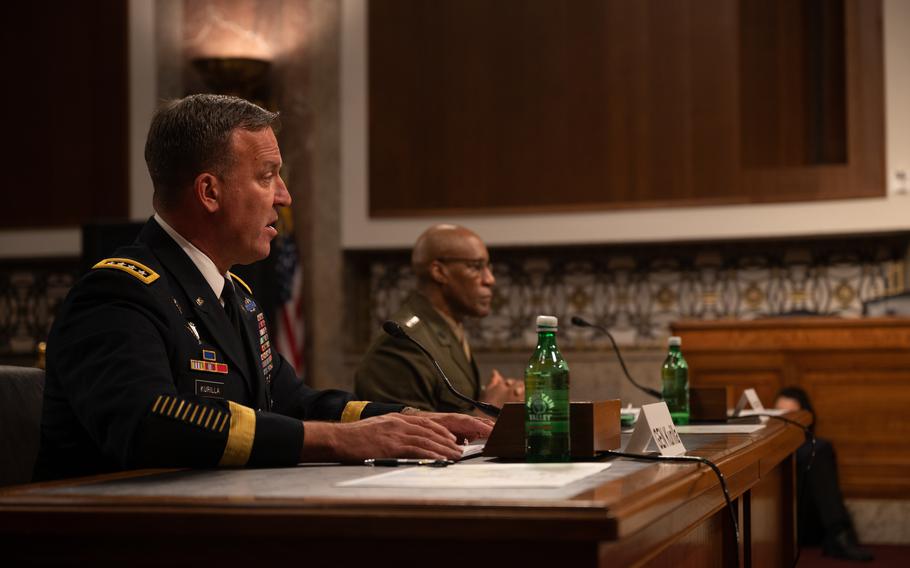
U.S. Army Gen. Michael “Erik” Kurilla, U.S. Central Command commander, and U.S. Marine Corps Gen. Michael E. Langley, U.S. Africa Command commander, provide testimony at a Senate Armed Services Committee posture hearing at the Dirksen Senate Office Building in Washington, D.C., March 16, 2023. (John Wright/U.S. Air Force)
WASHINGTON — The Islamic State network in Afghanistan will be able to attack American or Western interests outside the country in less than six months “with little to no warning,” the top commander for U.S. forces in the Middle East said Thursday.
Army Gen. Michael Kurilla, who leads U.S. Central Command, told the Senate Armed Services Committee that the Islamic State’s Khorasan Province, commonly referred to as ISIS-K, is rapidly developing the ability to conduct “external operations” in Europe and Asia.
The terrorist group will not be able to strike the U.S. homeland in the near future, however.
“I think it is a higher probability overseas than it is in the homeland,” Kurilla said, acknowledging hundreds of thousands of U.S. citizens living abroad could be in range of an attack.
The general’s assessment comes more than a year after U.S. troops withdrew from Afghanistan in August 2021 and adopted an “over-the-horizon” counterterrorism approach that collects intelligence and carries out strikes without a permanent military presence in the country.
The commander confirmed Thursday that the U.S. has only conducted one “kinetic” counterterrorism operation so far, a drone strike last year that killed al-Qaida leader Ayman al-Zawahiri in Kabul. But Kurilla said the U.S. has also performed two “non-kinetic” operations involving more than five combatant commanders that have disrupted terrorist activity.
He acknowledged the quality of U.S. intelligence has degraded since the pullout from Afghanistan, with the U.S. being able to see the “broad counters” of an attack but lacking the “granularity to see the full picture.”
Counterterrorism operations are now more difficult, but not impossible, Kurilla said. He said his command is working to close the intelligence gap by increasing investment into long-duration, high-altitude technology that can stay in the air for days and weeks.
“Right now, I’m spending 80% of my time transiting to the region to be able to collect over-the-top [intelligence],” Kurilla said.
The general also impressed on lawmakers that he needs more support for the analysts, linguists and other parts of the “analytical backside” that are critical for decision-making. There has been a “significant decrease” in their numbers in the Middle East as the U.S. military has reoriented to higher-priority targets, he said.
Kurilla said CENTCOM has shrunk by 85% since its peak in 2008, when the U.S. was at war in Afghanistan and Iraq. The command’s size was reduced by 15% after the 20-year war in Afghanistan ended.
Sen. Roger Wicker of Mississippi, the top Republican on the committee, said the U.S. left a security vacuum in Afghanistan that has been filled by the Taliban, al-Qaida and ISIS and emboldened their affiliates around the world. Republicans have repeatedly criticized the effectiveness of the “over-the-horizon” strategy.
Kurilla countered Thursday that the ISIS threat in Syria is contained compared to Afghanistan but conceded the ideology remains “uncontained and unconstrained.”
ISIS-K is responsible for killing or injuring at least 700 people in Afghanistan since the Taliban took over the country in August 2021, according to Human Rights Watch. The terrorist group carried out four high-profile attacks from December 2022 to January, hitting Afghanistan’s foreign ministry, the military section of Kabul’s airport, the Pakistani embassy and a hotel housing Chinese guests, according to the nonprofit Counter Extremism Project.